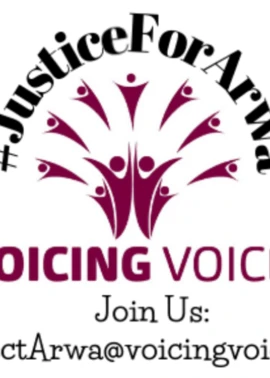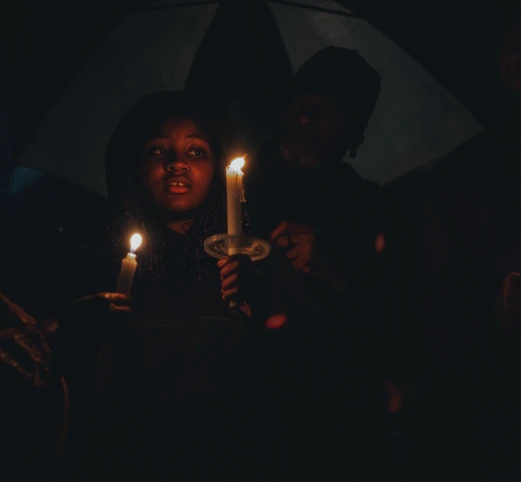Sabina Nasse, a public servant killed in London. Tshegofatso Pule, the 28-year-old mother stabbed and hung from a tree in South Africa she was 8 months pregnant. Add Farah Hamzah Akbar from Kuwait to the list of women murdered this year. She was a mother who was kidnapped, stabbed, and killed by a long-term stalker whom she had previously reported to the police on multiple occasions for harassment.
Enough is enough.
We no longer want to say ‘’she was…’’, we longer want to be another statistic to add to a long list of our sisters' names, we are driving change and voicing our voices.
Gender-based violence is a pandemic that we’ve disassociated from for far too long, yet it is so entrenched and normalised into the fibre of our everyday world. All the steps that lead to femicide are loud and present in our systems, societal structures, language, and cultures.
From birth, female infanticide alone takes the lives of 2 million baby girls in India and China. In the countries where some survive, girls are forced into child marriages where 7 million live as child brides in sub-Saharan Africa. Then we have the reality of what is happening here at home where 92% of girls complained of experiencing harmful sexual behaviours towards them in school.
The rape-culture and normalisation of how young girls exist in our world is the virus that traumatises women with public and domestic male violence. This is a phenomena where globally a total of 87,000 women have been intentionally killed in a year alone. More than half of them, 58%, were killed by intimate partners or family members.
Having worked in inner London schools as a secondary school teacher, I have testimonials of young girls and boys wanting to unlearn and relearn new ways of processing and communicating, but our lunch time or after school sessions weren’t enough to end sexual harassment. It is difficult to persuade systems set in their ways to prioritise relationship building, and have them understand how educators have a duty of care to equip youth with the necessary skills required to eliminate symptoms of this disease from an early age. These are basic life skills that can protect the lives of millions of girls worldwide.
At Voicing Voices, we are taking this into our own hands by training and mentoring people in workplaces to use their agency to lead as changemakers. We are initiating conversations at home through parent-child relationship building, in schools so students feel safe enough to achieve their dreams, in community and social spaces where stigma and shame silences victims.
This systematic phenomena requires systematic efforts that simultaneously strive towards the future we all envision for ourselves and for our communities.
One of our initiatives is in collaboration with visionary leaders like Qatar Medical Students Association from the International Federation of Medical Students Association where these bold, passionate, and highly motivated young people are manifesting a future where they are not living in fear or anxiety. They are advocating and working together to design healthy safe spaces for their community.
One of the reasons I founded Voicing Voices was to counteract the prevalence of violence against women and girls with the intersectional lens needed to systematically address gender-based violence and to use that data to modify the existing structures that have failed us for generations.
Academic qualifications alone will not be enough to shield girls from the trauma of male-violence. Itt is counterproductive to ignore this problem because whilst we are trying to teach them in the classroom, they are distressed from being sexually harassed and/or assaulted in the corridors or online.
We aim to raise awareness so there isn’t a substantial data gap in government thinking. We want to be represented and have our experiences considered when development discussions are being held. We want to advocate for the systematic transformation we need to eliminate this once and for all. It is very possible, but we must first have the courage to step forward, and co-design safe spaces for women and girls to achieve their human potential.
As everything stands right now, our silence will only allow for this cycle to continue to the next generation. I am writing this article to urge you to initiate these conversations wherever you are or whoever you are because this affects all of us.
Let’s systematically assess how every area of society can be designed with women’s safety and protection in mind.
Let these names of our lost sisters activate us into action. we shall not be shamed, and we will not suffer in silence. We have so much power as demonstrated by the global protests and mobilisation where we have all stood in solidarity globally.
We have to focus on protection and prevention;from safeguarding girls in our education systems, to public spaces so we can get home in one piece. We must live in a world where we aren’t anxious of being assaulted and murdered, or have to work in places where threats mute us to accept male violence.
We will address this war on women on an individual level where this reality is reversed, and it becomes shameful to protect perpetrators.
We want to be part of communities where we believe victims and provide them with safe spaces and effective coordination for reporting and attaining justice.
We will apply pressure on sectors that perpetuate rape-culture and normalise male- violence.
We will hold governments and national leaders accountable and address this pandemic that is traumatising 70% of women and girls.
This pandemic terrorises us globally, we need to internationally assemble and ask, how is violence against women and girls being prioritised on agendas? What investments are being made to ensure safety against male-violence domestically, in public spaces and in the world of work?
As someone who has seen, experienced and internationally worked in this space, the words of Poplar and Limehouse MP Apsana Begum from Tower Hamlets, resonate: “In the last six months, we have been reminded that not everyone is safe to walk home at night. The murders of Sarah Everard, Bibaa Henry, Nicole Smallman and now Sabina Nessa are all instances of gender-based violence. This is a societal issue that must be acted on by our government.”
As complex as the issue is, we can design sustainable solutions that transform our societies to become nations where we can feel safe enough to exist as humans, not as collateral damage for male-violence.
Views reflect those of the author.
Author

